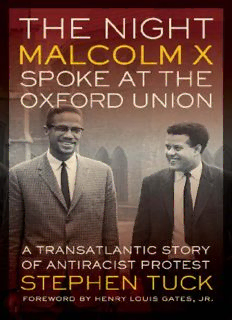
The night Malcolm X spoke at the Oxford Union : a transatlantic story of antiracist protest PDF
Preview The night Malcolm X spoke at the Oxford Union : a transatlantic story of antiracist protest
The Night Malcolm X Spoke at the Oxford Union The Night Malcolm X Spoke at the Oxford Union A Transatlantic Story of Antiracist Protest Stephen Tuck with a foreword by Henry Louis Gates Jr. University of California Press The publisher gratefully acknowledges the generous s upport of the African American Studies Endowment Fund of the University of California Press Foundation, which was established by a major gift from the George Gund Foundation. University of California Press, one of the most distinguished university presses in the United States, enriches lives around the world by advancing scholarship in the humanities, social sciences, and natural sciences. Its activities are supported by the UC Press Foundation and by philanthropic contributions from individuals and institutions. For more information, visit www.ucpress.edu. University of California Press Oakland, California © 2014 by The Regents of the University of California All quoted speeches by Malcolm X are from Malcolm X: Collected Speeches, Debates and Interviews (1960-1965), edited by Sandeep Atwal, and are available online at http://malcolmxfiles.blogspot.co.uk/p/malcolm-x-e-book.html. CIP data for this title is on file at the Library of Congress. isBn 978-0-520-27933-9 Manufactured in the United States of America 23 22 21 20 19 18 17 16 15 14 10 9 8 7 6 5 4 3 2 1 In keeping with a commitment to support environmentally responsible and sustainable printing practices, UC Press has printed this book on Natures Natural, a fiber that contains 30% post-consumer waste and meets the mini- mum requirements of ansi/niso z39.48– 1992 (r 1997) (Permanence of Paper). For my mother, Norah, and in memory of my father, George (1930-2013) Yes. One thing . . . travel always broadens one’s scope. Travel does. — Malcolm X, interview with Les Crane, December 27, 1964 Brother Malcolm was our manhood, our living, Black manhood! . . . our own Black shining Prince, who didn’t hesitate to die, because he loved us so. — Magazine of the Black Eagles, a British Black Power group, 1965 (quoting eulogy to Malcolm X by Ossie Davis) Contents Photo section follows page 106. Foreword, by Henry Louis Gates Jr. xi Acknowledgments xxi Prologue: A Black Revolutionary Meets Historic Oxford 1 1. A Life of Travel and Discovery: Malcolm X, 1925– 1964 9 2. Oxford, Britain, and Race, 1870– 1964 50 3. Antiracism Protests in Oxford, 1956– 1964 93 4. The Debate, December 3, 1964 142 5. After the Debate, 1964– 1968 165 Epilogue 197 Notes 205 Index 243 foreword This year, the American public is commemorating the fifti- eth anniversary of the Beatles’ “British Invasion,” broadcast on CBS’s Ed Sullivan Show, which delightfully electrified the spirit of a heart-heavy nation, still in shock and mourning over the assassination of John F. Kennedy. But 1964 also witnessed the reverse transatlantic journey of a man once known as Malcolm Little— better known as Malcolm X— in a revolutionary and more substantive performance at the legendary Oxford Union, an Oxbridge staple that has been showcasing another form of entertainment since long before Ed Sullivan hit the air. In fact, the Union, now in its 190th year, has hosted figures as diverse as Gladstone and the Dalai Lama, with Einstein, Churchill, Rea- gan, and Tutu in between. On the night of December 3, 1964, Malcolm X arrived to debate the topic of “extremism in the defense of liberty,” in a world swirling with social struggle in the United States, a nascent war in Vietnam, and the awkward birth of independence in postcolonial Africa. His performance is as iconic as any in the Oxonian pantheon of great debates, and ix
Description: